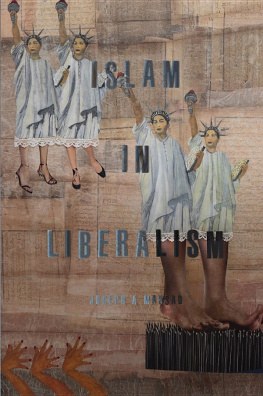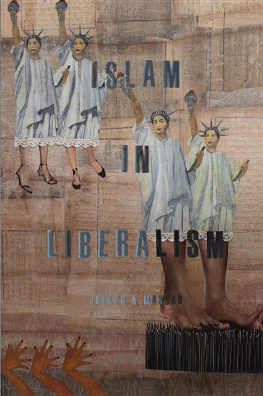Massad - The Persistence of the Palestinian Question
Here you can read online Massad - The Persistence of the Palestinian Question full text of the book (entire story) in english for free. Download pdf and epub, get meaning, cover and reviews about this ebook. year: 2006, publisher: Taylor and Francis, genre: Politics. Description of the work, (preface) as well as reviews are available. Best literature library LitArk.com created for fans of good reading and offers a wide selection of genres:
Romance novel
Science fiction
Adventure
Detective
Science
History
Home and family
Prose
Art
Politics
Computer
Non-fiction
Religion
Business
Children
Humor
Choose a favorite category and find really read worthwhile books. Enjoy immersion in the world of imagination, feel the emotions of the characters or learn something new for yourself, make an fascinating discovery.

The Persistence of the Palestinian Question: summary, description and annotation
We offer to read an annotation, description, summary or preface (depends on what the author of the book "The Persistence of the Palestinian Question" wrote himself). If you haven't found the necessary information about the book — write in the comments, we will try to find it.
Massad: author's other books
Who wrote The Persistence of the Palestinian Question? Find out the surname, the name of the author of the book and a list of all author's works by series.
The Persistence of the Palestinian Question — read online for free the complete book (whole text) full work
Below is the text of the book, divided by pages. System saving the place of the last page read, allows you to conveniently read the book "The Persistence of the Palestinian Question" online for free, without having to search again every time where you left off. Put a bookmark, and you can go to the page where you finished reading at any time.
Font size:
Interval:
Bookmark:
How is the Jewish Question related to the Palestinian Question?
Images of horror from Israel and the Occupied Palestinian Territories are now familiar to Western readers but the meaning of these, despite and perhaps because of the flood of competing analyses, remains contentious to many. In this erudite and unsettling series of essays, renowned Columbia University Professor Joseph Massad asks and answers the key questions: What has been the main achievement of the Zionist movement? What accounts for the failure of the Palestinian National Movement to win its struggle against Israel? What do anti-Semitism, colonialism, and racism have to do with the Palestinian/Israeli conflict?
Dr Massad here proposes more than the usual review of the ideological and political histories of Zionism and Palestinian nationalism. It is not in de-linking the Palestinian Question from the Jewish Question that a resolution can be found but by linking them as one and the same question. All other proposed solutions, the author argues, are bound to fail.
The book analyzes the failure of the peace process and proposes that a solution to the Palestinian Question will not be found unless settler-colonialism, racism, and anti-Semitism are abandoned as the ideological framework for a resolution. Individual essays further explore the struggle over Jewish identity in Israel and the struggle among Palestinians over what constitutes the Palestinian Question today.
This book will delight and discomfort many, offering a radical departure from mainstream analysis in order to expose the causes for the persistence of the Palestinian Question. Deeply researched and documented, The Persistence ofthe Palestinian Question is essential reading for those with interests in Middle East politics, Jewish studies, colonialism, and nationalism.
Joseph A. Massad is Associate Professor of Modern Arab Politics and Intellectual History at Columbia University. He is the author of Colonial Effects: The Makingof National Identity in Jordan (2001).
Palestinian Question

First published 2006
by Routledge
2 Park Square, Milton Park, Abingdon, Oxon OX14 4RN
Simultaneously published in the USA and Canada
by Routledge
270 Madison Ave, New York, NY 10016
Routledge is an imprint of the Taylor & Francis Group
2006 Joseph A. Massad
This edition published in the Taylor & Francis e-Library, 2006.
To purchase your own copy of this or any of Taylor & Francis or Routledges collection of thousands of eBooks please go to www.eBookstore.tandf.co.uk .
All rights reserved. No part of this book may be reprinted or reproduced or utilised in any form or by any electronic, mechanical, or other means, now known or hereafter invented, including photocopying and recording, or in any information storage or retrieval system, without permission in writing from the publishers.
British Library Cataloguing in Publication Data
A catalogue record for this book is available
from the British Library
Library of Congress Cataloging in Publication Data
A catalog record for this book has been requested
ISBN10: 0-415-77009-2 (hbk)
ISBN10: 0-415-77010-6 (pbk)
ISBN13: 9-78-0-415-77009-5 (hbk)
ISBN13: 9-78-0-415-77010-1 (pbk)
The post-colonial colony: time, space, and bodies in Palestine/Israel, first appeared in The Pre-Occupation of Post-Colonial Studies , edited by Fawzia Afzal-Khan and Kalpana Seshadri-Crooks (Durham, NC: Duke University Press, 2000). Reprinted by permission of Duke University Press, copyright (2000).
Conceiving the masculine: gender and Palestinian nationalism, first appeared in Middle East Journal (Summer 1995) Vol. 49(3), 467483. Reprinted by permission of Middle East Journal .
Zionisms internal others: Israel and the Oriental Jews, first appeared in Journal of Palestine Studies (Summer 1996) No. 100, 5368. Reprinted by permission of California University Press, copyright (1996).
Palestinians and the limits of racialized discourse, first appeared in SocialText (Spring 1993) No. 34, 94114. Reprinted by permission of Duke University Press, copyright (1993).
Repentant terrorists or settler-colonialism revisited: the PLOIsraeli agreement in perspective, first appeared in Found Object (Spring 1994) No. 3, 8190. Reprinted by permission of the Center for the Study of Culture, Technology and Work, City University of New York, copyright (1994).
Political realists or comprador intelligentsia: Palestinian intellectuals and the national struggle, first appeared in Critique (Fall 1997), 2335, http://www.tandf.co.uk . Reprinted by permission of Taylor and Francis, copyright (1997).
Return or permanent exile? Palestinian refugees and the ends of Oslo, first appeared in Critique (Spring 1999) No. 14, 523, http://www.tandf.co.uk . Reprinted by permission of Taylor and Francis, copyright (1999).
Palestinians and Jewish history: recognition or submission? first appeared in Journal of Palestine Studies (Fall 2000) No. 117, 5267. Reprinted by permission of California University Press, copyright (2000).
The ends of Zionism: racism and the Palestinian struggle, first appeared in Interventions (2003) Vol. 5(3), 440451, http://www.tandf.co.uk . Reprinted by permission of Taylor and Francis, copyright (2003).
History on the line: Joseph Massad and Benny Morris discuss the Middle East, Debate with Israeli historian Benny Morris, first appeared in HistoryWorkshop Journal (Spring 2002) 205216. Reprinted by permission of Oxford University Press, copyright (2002).
The persistence of the Palestinian Question, first appeared in CulturalCritique (Winter 2005) No. 59, 123. Copyright (2005) by the Regents of the University of Minnesota. Reprinted by permission of the University of Minnesota Press.
Terror is a name that is never assumed but always tendered. The taxonomy that transforms it from a practice into an identity is always particular. State power designates certain practices as terror and christens those who commit them as terrorists. Yet all subjects thus named do not accept their State-tendered names, and do not identify with them (there is, e.g. no Irish Terrorist Army, no African Terrorist Congress, and no Palestine Terror Organization). If the condition of identity is its having subjective and objective components (internalization and interpellation), terrorist identities remain contested terrains, controlled by an enemy who is in power and who controls the means of representation. While all subjective identities (sexual, racial, national, etc.) posit a self and an other as its opposite, objective identities are constituted similarly but from anothers subject position. In the case of the terrorist, it is the other, the enemy, and not the self, who defines the identity of the terrorist, specifying its self and its other. Since the State itself as enemy of terror defines the terrorists self, does it posit itself as the terrorists other? This applies just as much to the Superpower State that designates groups and weaker states as terrorists. Is this process nothing less than Nietzsches slave-morality at work, or is it the Hegelian telos of the journey of self-consciousness toward absolute freedom and terror, or, is it of a different order altogether? What exactly is the opposite of terror as a practice? Indeed, what is the opposite of the terrorist as identity?
Font size:
Interval:
Bookmark:
Similar books «The Persistence of the Palestinian Question»
Look at similar books to The Persistence of the Palestinian Question. We have selected literature similar in name and meaning in the hope of providing readers with more options to find new, interesting, not yet read works.
Discussion, reviews of the book The Persistence of the Palestinian Question and just readers' own opinions. Leave your comments, write what you think about the work, its meaning or the main characters. Specify what exactly you liked and what you didn't like, and why you think so.












